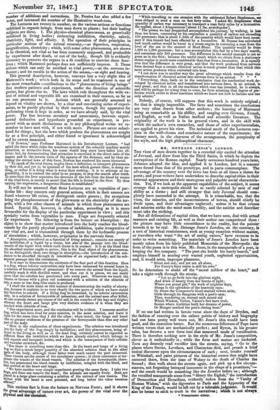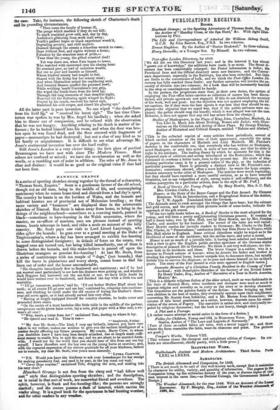MR. HENEAGE JESSE'S LONDON.
THE vices of men drawn together in a crowded city excited the attention of Juvenal, and drew from him the Third Satire, in which he depicts the corruptions of the Roman capital. Nearly seventeen hundred years later, Johnson adopted the idea, and applied it to London, but in a manner more forced than that of his prototype, and in parts commonplace. The advantage of the country over the town has been at all times a theme for poets; and prose writers have undertaken to describe capital cities in their external appearances and their more gross and palpable social characteris- tics. Yet, if we look at the apparent capabilities of the subject, it seems strange that a metropolis should be so rarely selected by men of real ability as a theme - and still stranger that only Juvenal should com- pletely have succeeded in the attempt. It is remarkable, too, that the vices, the miseries, and the inconveniences of town; should chiefly be dwelt upon, and their advantages neglected; unless it be that crimes and miseries strike the mind most forcibly, and the satirist and describer must take the striking. But all delineations of capital cities, that we have seen, deal with actual manners and existing life, as well as their author can comprehend them : the picture may have little resemblance to the reality, but the painter intends it to be real. Mr. Heneage Jesse's London, on the contrary, is a sort of historical reminiscence, such as young essayists without matter, or travellers who want " the art of seeing nature," have recourse to in order to write something. The materials of Jesse's London have been mostly taken from his lately published Memorials of the Metropolis : the form of the poem is in this wise. Mr. Jesse, in the masquerade of a poet, is keeping the fire company. "The poet sits beside his lonely hearth," and employs himself in musing over wasted youth, neglected opportunities, and, it would seem, improper pleasures.
" Silent and sad; and yet not all alone, For Fancy's fairy realm is still his own." So he determines to shake off the "moral mildew of the heart," and take a night•walk through the streets.
" Let us go forth into the glorious night,
And drink of beauty from her founts of light; Where yon proud pile," the work of mightier days, Sleeps in the splendour of the heavenly rays; Or where the Conqueror's blood-stained towers arise, Glide through its dungeons with a poet's eyes; Then, wandering on, retread each sacred sod Which Wisdom, Virtue, Valour's feet have trod; Scenes where Ambition built her dreams of power, Or Hunger mocked the poet's closing hour."
If no one had written in heroic, verse since the days of Dryden, and the fashion of running over the salient points of history and biography had not been pretty well worn out, Mr. Jesse's idea would have been good, and the execution better. But the numerous followers of Pope have written verses that are mechanically perfect ; and Byron, in his greater tales, has thrown a new force into that measured mode of versification. There is therefore nothing new in the style of Mr. Jesse's composition, clever as it undoubtedly is ; while the form and matter are hacknied. Turn any decently read versifier into the streets, saying, " Go to the places where Stern; Lovelace, and Chatterton died, and preach a brief stoical discourse upon the circumstances of each ; next, betake yourself to Whitehall, and paint pictures of the historical scenes that might have occurred there, from the time of Wolsey to the death of Charles the Second ; then walk about the streets again, and pick up a few circum- stances, not forgetting betrayed innocence in the shape of a prostitute,"— and the result would be something like the London before us ; although the versified masquerade scene from "Henry the Eighth," the introduction of Democritus and Heraclitus, evidently taken from the " Vanity of Human Wishes," with the digression to Paris and the hypocrisy of the King of the French, would be left out by a tolerable judgment. It would also be better to stick to truth in the narratives ; which is not always • Westminster Abbey. the case. Take, for instance, the following sketch of Chatterton's death
and its preceding circumstances. " Then came the family of human ill, The pangs which madden if they do not kill; To mark mankind grow cold, and, day by day, Ambition's glittering fret-work melt away; Youth's gallant hopes on black experience wreck'd, Degrading poverty, and chill neglect; Doomed through the streets a homeless wretch to roam; Days without food, and nights without a home; Forsaken by the senseless sons of pride,- 'Twas thus the young, the gifted minstrel died!
Yet was there one, when Fate began to lower, Who watched with moistened eyes his closing hour. No ermined peer, no lord of countless wealth, But one as poor and humble as himself, Whom kindred misery had taught to feel, Shared with the dying boy her scanty meal; And when Distraction seized his maddening soul, And frenzied Reason quaffed thepoisoned bowl; While writhing 'neath Convulsion a iron grip, She wiped the death-foam from his livid lip;
Through the long moments of that dreadful night,
Watched till the flattering spirit winged its flight; Prayed by his couch, received his latest sigh, Smoothed his cold corpse, and closed his glazing eye."
All the latter part is pure invention. No one wiped " the death-foam from his livid lip," or " received his latest sigh." The last time Chat- terton was spoken to was by Mrs. Angel his landlady ; when she asked him to dinner out of compassion, and he refused with the observation that he was not hungry. Anything relating to his death is matter of in- ference; for he locked himself into his room, and when the door was bro- ken open he was found dead, and the floor strewed with fragments of paper—manuscripts he had destroyed ; but not a clue of any kind as to his family or acquaintance. It is difficult to see what advantage Mr. Jesse's sentimental invention has over the hard reality.
Still Jesse's London is a very clever thing ; the best piece of poetical Brummagem we have met with since The Modern Timon. Most echoes are confused or mixed ; we have the reverberation as well as the words, or a rumbling sort of noise in addition. The echo of Mr. Jesse is clear and distinct : it would be as good as the original voice if that had not been first.



























 Previous page
Previous page